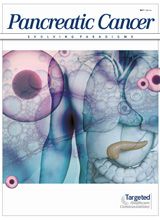Earlier Use on Horizon for Novel Agents in Pancreatic Cancer
With the wealth of data demonstrating efficacy in the metastatic setting, researchers are now assessing nab-paclitaxel/gemcitabine as both an adjuvant and neoadjuvant treatment for patients with pancreatic cancer.
In a small retrospective case study exploring nab-paclitaxel plus gemcitabine as neoadjuvant therapy for borderline resectable or unresectable locally advanced pancreatic adenocarcinoma,14both the R0 resection rate and the response rate were 20%. Findings from the study were presented at the 2016 Gastrointestinal Cancers Symposium.
The study looked at 20 patients at a median age of 69 years. The most common ECOG PS was 1 (55%). A majority of the patients had borderline resectable disease (n = 14; 70%).
Out of 6 patients who went on to receive surgery, 83% also had preoperative radiation and 67% had R0 resections. All patients with an R0 resection (n = 4) were initially defined as borderline resectable. Two patients with unresectable disease by imaging at presentation were able to undergo potentially curative surgery, although an R0 resection was not achieved. Median progression-free survival was 9.1 months (95% CI, 6.2-12.0).
The majority of patients in the study received 6 to 9 doses of nab-paclitaxel and gemcitabine. The partial response rate was 20% and the stable disease rate was 70%. In total, dose reductions were required for 64% of patients, a finding that will be applied to future studies.
Larger studies with longer follow-up are planned to determine whether low-dose neoadjuvant nab-paclitaxel and gemcitabine followed by radiation can lead to long-term disease control for patients with borderline resectable or unresectable locally-advanced pancreatic adenocarcinoma. University of Pennsylvania researchers are also doing a small dose escalation study involving 25 patients, in which the dose of both nab-paclitaxel and radiation are increased, with data available in about a year.
Additionally, researchers are now exploring the same strategy in a prospective fashion in a study with 280 patients accrued across the United States, according to the senior author of the poster Peter Hosein, MD, assistant professor of medicine at the University of Kentucky.
Another trial, known as NEONAX, is examining the use of nab-paclitaxel prior to surgery. In this trial, one arm will receive nab-paclitaxel plus gemcitabine both before and after surgery, while the other arm will receive the combination only after surgery. The trial is investigating the treatment in patients with non-metastatic pancreatic cancer.
As part of the trial, researchers will also investigate potential biomarkers such as hENT1, CDA, DCK, 5´-nucleotidase, CA19-9, SPARC, and neutrophil-lymphocyte ratio. The NEONAX researchers intend to enroll 166 participants, with a primary completion date of March 2019 (NCT02047513).
Following surgery, the phase III APACT trial is comparing nab-paclitaxel plus gemcitabine with gemcitabine alone in patients with resectable cancer who have already undergone surgery. Investigators intend to enroll 800 patients, with a primary completion date of April 2019. An R0 or R1 resection is required prior to entry into this trial.
In APACT, biomarkers will also be assessed as exploratory endpoints. The primary outcome will measure disease-free survival, with secondary endpoints focused on OS and safety. At this time, gemcitabine alone is the standard adjuvant therapy for patients with pancreatic cancer.
In the study, nab-paclitaxel will be administered at 125 mg/m2 along with gemcitabine at 1000 mg/m2 on days 1, 8, and 15 for 6 cycles. Gemcitabine will be administered alone at 1000 mg/m2 on days 1, 8, and 15. The trial is currently recruiting (NCT01964430).

Survivorship Care Promotes Evidence-Based Approaches for Quality of Life and Beyond
March 21st 2025Frank J. Penedo, PhD, explains the challenges of survivorship care for patients with cancer and how he implements programs to support patients’ emotional, physical, and practical needs.
Read More